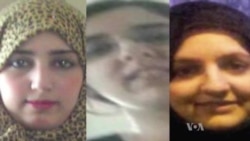In front of banks of TV cameras last week, three men pleaded for their wives and children to come home. Earlier this month, the wives, who are sisters, disappeared with their nine children on the way back from a pilgrimage to Saudi Arabia. It’s believed they crossed from Turkey into Syria to join the Islamic State terror group.
One of the husbands, Mohammed Shoaib, made an emotional appeal: “They are young kids, 7 and 5, and you know I love you so much.”
Three British schoolgirls from London joined Islamic State in February. Earlier this month, a 17-year-old boy from northern England blew himself up in a suicide attack in Iraq for Islamic State. Days later, a white British Muslim convert, Thomas Evans, was killed fighting for al-Shabab in Somalia.
Speaking at a security conference in Slovakia last week, Prime Minister David Cameron said the Muslim community in Britain must do more to counter radical views.
“There are people who hold some of these views, who don't go as far as advocating violence, but who do buy into some of these prejudices, giving the extreme Islamist narrative weight and telling fellow Muslims, 'You are part of this.' This paves the way for young people to turn simmering prejudice into murderous intent,” he said.
Mistaken view?
The British prime minister is taking the wrong approach, argued radicalization expert Joana Cook of King's College London.
“By viewing the Muslim community as one single, unified unit like this, you really do not understand the diversity of the community," she said. "And by a sweeping broad analysis like this, you also risk alienating the law-abiding, peaceful citizens that are going to be your biggest allies.”
Instead, Cook said, authorities should engage more deeply with Muslim communities.
“Nobody wants to see their child go abroad or fall victim to radicalization or become radicalized," she said. "So this is very important for a lot of people in these communities, and it’s very important to have strong, positive relations between security actors and communities.”
The European Union’s law enforcement agency Europol has set up a unit to take down social media accounts that promote the group. It’s an important albeit belated step, said terror expert Abdel Bari Atwan, author "Islamic State: The Digital Caliphate."
“They have thousands of accounts on Twitter, Facebook, YouTube,” he said.
'Gift' of social media
Atwan said Islamic State has exploited these accounts as a recruiting tool.
“Social media is a God’s gift to the Islamic State," he said. "Why? It is free, it is accessible, and it is very, very influential. So if you compare the Islamic State with Osama bin Laden, for example, Osama bin Laden used to rely completely on Al Jazeera in order to broadcast his videotape, and they used to edit a lot of it.”
Islamic State’s latest gruesome propaganda video was released Tuesday — showing the elaborate execution of 12 alleged spies.





